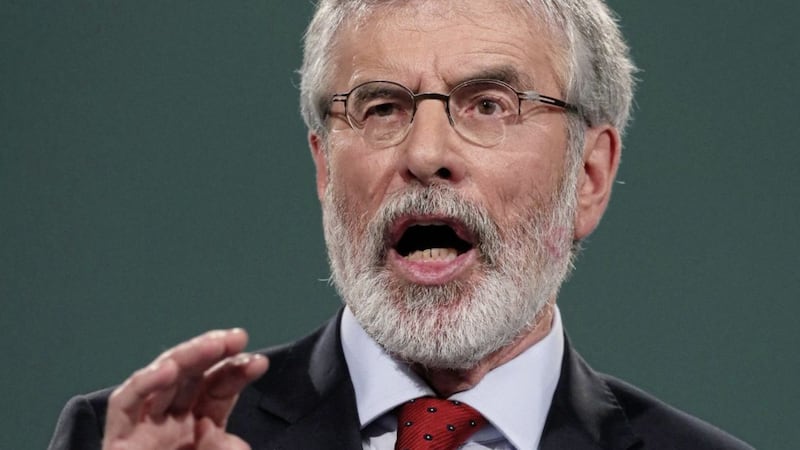It is still worth paying attention to Gerry Adams, although he is losing media traction as his retirement date approaches - and the message the Sinn Féin president sent loudly and clearly in an Irish Times interview this week is that there will be no movement at Stormont before a meeting of the British-Irish Intergovernmental Conference.
Sinn Féin cannot lose by waiting to see what comes from this summit, which Taoiseach Leo Varadkar demanded two months ago if devolution was not restored by the New Year.
Either Dublin will deliver for nationalists and Sinn Féin can take the credit for applying the necessary pressure, or Varadkar will achieve nothing and Sinn Féin can paint him as weak, or no meeting will occur and the DUP-Tory bogeyman can be invoked.
Nobody can blame republicans for seizing the opportunity Varadkar has presented. The question is whether the taoiseach should be blamed for not thinking this through.
**
Entering the New Year without agreement means Stormont has missed the talking season - the four months after the summer when doing deals has become, as Orangemen say, traditional. This window is defined by: the marching season, when politics goes on hold and before which nobody risks agreeing anything; September, when the assembly normally reconvenes; October, when budget reallocations create financial deadlines; and finally Christmas, the psychological deadline to all of the above.
This pattern has become so established it repeated itself annually for three years up to 2015 and would have done so again this year had Brexit and Dublin not introduced complications.
In theory, another talking season exists up to Easter, due to the end of the public sector financial year in March. If that psychological deadline is missed, however, the next one is Christmas 2018.
**
Calls for an Irish passport office in Northern Ireland have been downplayed by the Irish government, which suggested the UK authorities might be displeased. If such concerns exist they are parochial from a European perspective. The problem Brussels has with extra-territorial passports - creating EU citizens beyond the EU frontier - lies in Eastern Europe, where over the past decade Hungary, Bulgaria and Romania have all begun issuing passports to residents of neighbouring countries where they have historic ethnic ties. Romania has laid claim to the entire population of non-EU Moldova, partitioned from it by the Soviet Union. Advocates of reunification are known, delightfully, as unionists.
Other non-EU countries where millions of people are being offered EU passports include Serbia, Ukraine and Turkey. Many of the affected governments consider this a hostile act - making the EU doubly wary of setting Irish precedents.
**
Ulster University is relying on private developers to provide student accommodation around its new central Belfast campus but Queen's University is getting into the market itself, building serviced apartments and studios in the middle of town. Promotion of the properties has now begun and while standards look high, rents are even higher - £130 per week for a room or £140 for a studio. The university is marketing this as part of its official undergraduate accommodation.
The last national student accommodation survey, published in October 2017, found Northern Ireland was the cheapest part of the UK with average weekly rents of £91. Almost every other region came in at less than Queen's plans to charge - even the south east of England averaged just £132. Considering how much of university and student spending is ultimately covered by the taxpayer, London rents in Belfast require a robust explanation.
**
The UK Home Office has been testing a ‘Border Volunteer Force’ to assist its staff after Brexit. Volunteers could eventually be sought to help guard smaller ports, harbours and marinas around Great Britain. The term ‘volunteer force’ would obviously be problematic if the scheme was extended here. How about the Border Specials?
**
Sinn Féin has presented the department of infrastructure with “amendments” to the Belfast Rapid Transit scheme, including opening lanes up to all taxis (black taxis can use bus lanes already.) If that rings a bell it is because the same demand was made last year by taxi operators. The department, which Sinn Féin had been running, held a mysterious 12-week trial allowing taxis into the BRT routes, arranged without consultation or specification. Sinn Féin now says this trial was “a success” - although officials have never been able to explain by what criteria they would have judged success, putting this claim in the category of ‘not even wrong’. Sinn Féin also says it wants the department “to do what is right here for ordinary working-class taxi drivers”. There is no mention of bus passengers getting to work or of Unite the Union’s objection to the taxi trial on behalf of Translink staff, which stated: “It is simply unacceptable for the Belfast Rapid Transit project to be subverted by private sector interests”
newton@irishnews.com









